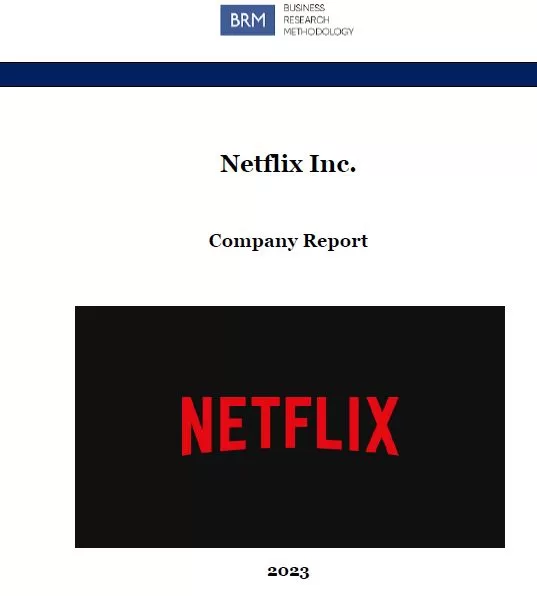Netflix Inc. Report 2023
$9.99
Netflix Inc., the largest streaming service in the world, was incorporated on August 29, 1997 and began operations on April 14, 1998. The entertainment services provider has 231 million paid memberships in over 190 countries.[1] The company employs about 12,800 people in more than 25 countries.[2] Consolidated revenues for the year ended December 31, 2022 increased 6% as compared to the year ended December 31, 2021, due to the 6% growth in average paying memberships and a 1% increase in average monthly revenue per paying membership.
Netflix business strategy involves prioritizing revenues maximization over membership growth and increasing investments on original content. Moreover, the streaming service has decided to stay focused on movies, series and documentaries not entering news and live sports segments. The on-demand media provider had change of leadership in 2023 with co-founder Reed Hastings stepping down from the role of co-CEO and Ted Sarandos and Greg Peters becoming new co-CEOs.
The largest streaming service in the world has flat organizational culture and its organizational culture has been a subject of case studies in business schools for its unconventionality and effectiveness. Specifically, Netflix organizational culture effectively encourages decision making by employees at all levels and the company has taken information sharing to a whole new level. The popular streaming platform despises rules and communication practices there are candid and direct.
Along with its obvious strengths such as first mover advantage, quality original content and global presence, the entertainment services provider has certain weaknesses as well. Namely, Netflix has high level of indebtedness and its business model depends on other companies. Furthermore, the company is over-dependent on North American home market and there is a room for improvement on its customer services.
[1] Annual Report (2022) Netflix Inc.
[2] ESG Report (2022) Netflix Inc.
Description
Netflix Inc., the largest streaming service in the world, was incorporated on August 29, 1997 and began operations on April 14, 1998. The entertainment services provider has 231 million paid memberships in over 190 countries.[1] The company employs about 12,800 people in more than 25 countries.[2] Consolidated revenues for the year ended December 31, 2022 increased 6% as compared to the year ended December 31, 2021, due to the 6% growth in average paying memberships and a 1% increase in average monthly revenue per paying membership.
Netflix business strategy involves prioritizing revenues maximization over membership growth and increasing investments on original content. Moreover, the streaming service has decided to stay focused on movies, series and documentaries not entering news and live sports segments. The on-demand media provider had change of leadership in 2023 with co-founder Reed Hastings stepping down from the role of co-CEO and Ted Sarandos and Greg Peters becoming new co-CEOs.
The largest streaming service in the world has flat organizational culture and its organizational culture has been a subject of case studies in business schools for its unconventionality and effectiveness. Specifically, Netflix organizational culture effectively encourages decision making by employees at all levels and the company has taken information sharing to a whole new level. The popular streaming platform despises rules and communication practices there are candid and direct.
Along with its obvious strengths such as first mover advantage, quality original content and global presence, the entertainment services provider has certain weaknesses as well. Namely, Netflix has high level of indebtedness and its business model depends on other companies. Furthermore, the company is over-dependent on North American home market and there is a room for improvement on its customer services.
[1] Annual Report (2022) Netflix Inc.
[2] ESG Report (2022) Netflix Inc.

